the hundred years’ war on palestine pdf
- by leo
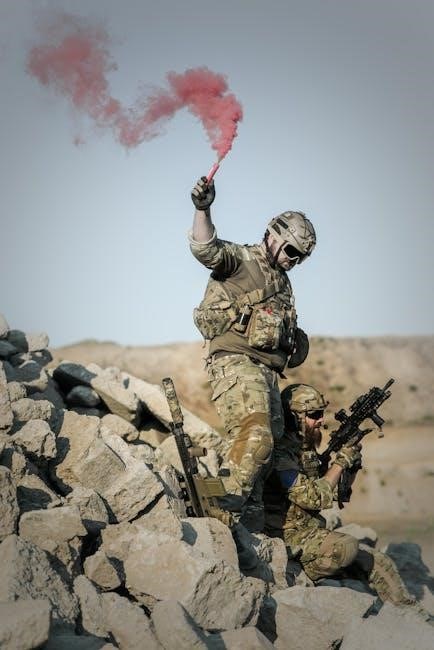
The Hundred Years War on Palestine by Rashid Khalidi traces the century-long struggle of Palestinians under Zionist settler colonialism, backed by British and American power, from 1917 to 2017. Drawing on family archives and historical records, Khalidi reshapes the narrative, emphasizing Palestinian resistance and resilience against dispossession. This groundbreaking work challenges dominant perspectives, offering a vivid account of a conflict shaped by imperialism and indigenous struggle.
Overview of the Book and Its Significance
The Hundred Years War on Palestine by Rashid Khalidi is a landmark historical account that reexamines the Israeli-Palestinian conflict through the lens of settler colonialism and resistance. Spanning a century from 1917 to 2017, the book identifies six pivotal events that shaped the conflict, including the Balfour Declaration and the 1948 establishment of Israel. Khalidi draws on personal family archives and untapped historical sources to present a Palestinian-centered narrative, challenging dominant perspectives. The book’s significance lies in its meticulous scholarship and its ability to humanize the Palestinian experience, offering a fresh interpretation of the conflict as a colonial war fueled by external powers. It has been praised for its authoritative and empathetic approach, making it a vital resource for understanding the region’s history and ongoing struggles.
Historical Context of the Israeli-Palestinian Conflict
The Hundred Years War on Palestine situates the Israeli-Palestinian conflict within the broader framework of colonial history. The book highlights how the 1917 Balfour Declaration, which promised a Jewish homeland in Palestine, catalyzed a century of dispossession and resistance. Khalidi emphasizes the role of external powers, particularly Britain and the United States, in supporting Zionist settler colonialism, which fundamentally altered Palestine’s demographics and political landscape. By tracing the conflict’s evolution through key events such as the 1948 Nakba and subsequent wars, the book provides a comprehensive historical context, underscoring the enduring impact of colonialism on the region and its people. This historical lens illuminates the roots of the ongoing struggle for Palestinian self-determination and justice.
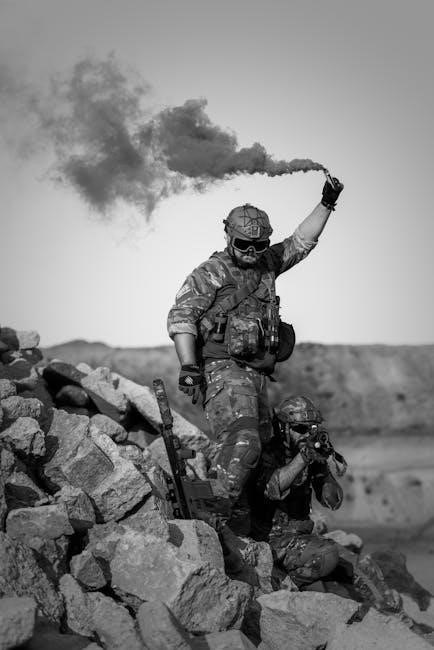
The Balfour Declaration of 1917
The 1917 Balfour Declaration was a British government statement expressing support for a Jewish homeland in Palestine, dismissed Palestinian rights, and ignited a century of conflict.
Origins and Implications of the Declaration
The Balfour Declaration emerged from British imperial ambitions during World War I, aiming to secure international Jewish support. Issued in 1917, it endorsed a Jewish homeland in Palestine without acknowledging the indigenous Palestinian majority. This decision, embedded in a brief letter, had profound implications, sowing the seeds of a century-long conflict. It dismissed Palestinian rights and aspirations, setting the stage for displacement and resistance. The Declaration also reflected the broader colonial mindset, treating Palestine as a territory to be shaped by external powers rather than its own inhabitants. Its legacy remains central to the Israeli-Palestinian conflict, symbolizing the clash of nationalisms and imperial designs.
Impact on the Palestinian Population
The Balfour Declaration had devastating consequences for Palestinians, leading to their gradual displacement and marginalization. The declaration’s endorsement of a Jewish homeland ignored the rights of the Palestinian majority, fostering a sense of betrayal and injustice. Over the decades, it facilitated Zionist expansion, resulting in the 1948 Nakba, where hundreds of thousands of Palestinians were forcibly expelled. This dispossession, combined with ongoing occupation and settler colonialism, has caused enduring suffering for Palestinians, including statelessness, refugee crises, and human rights violations. The declaration’s legacy continues to shape their struggle for self-determination and justice, as detailed in Khalidi’s comprehensive analysis in “The Hundred Years War on Palestine.”

Settler Colonialism and Resistance
Settler colonialism in Palestine is defined as a late form of colonialism, where Zionist movements, backed by British and American powers, sought to displace the indigenous Palestinian population. Resistance emerged in various forms, including political, armed, and civil disobedience, as Palestinians fought to maintain their land and identity against overwhelming odds. Khalidi’s analysis highlights the colonial nature of the conflict and the enduring spirit of Palestinian resistance in the face of dispossession and occupation. This struggle remains central to the narrative of the Israeli-Palestinian conflict, as detailed in “The Hundred Years War on Palestine.”
Definition and Historical Context of Settler Colonialism
Settler colonialism refers to a form of colonialism where an invading population seeks to permanently replace the indigenous population, erasing their identity and claim to the land. In Palestine, this process began in the late 19th century with the rise of the Zionist movement, which sought to establish a Jewish homeland. The 1917 Balfour Declaration marked the beginning of British support for this project, leading to the displacement of Palestinians. Khalidi argues that settler colonialism in Palestine is unique, as it was facilitated by external powers and framed as a “national liberation” movement. This colonial framework has shaped the Israeli-Palestinian conflict, with its roots in imperialism and the denial of Palestinian sovereignty.
Palestinian Resistance Movements
Palestinian resistance movements have played a pivotal role in challenging settler colonialism and asserting national identity. From the 1917 Balfour Declaration to the present, Palestinians have employed diverse strategies, including armed struggle, civil disobedience, and diplomatic efforts. Key movements include the 1936-1939 Arab Revolt, the First Intifada (1987-1993), and the Second Intifada (2000-2005). These movements have been driven by a refusal to accept displacement and occupation, emphasizing the right to self-determination. Despite facing immense repression, Palestinian resistance has maintained a steadfast commitment to justice and equality, inspiring global solidarity and reshaping the narrative of the conflict.

The Role of External Powers
External powers, notably Britain and the US, have significantly influenced the Israeli-Palestinian conflict through political and military support, perpetuating colonial dynamics.
British and American Involvement in the Conflict
The British and American involvement has been pivotal in shaping the Israeli-Palestinian conflict. Britain’s 1917 Balfour Declaration, endorsing a Jewish homeland, laid the foundation for Zionist expansion, disregarding Palestinian rights. Post-WWII, the U.S. emerged as Israel’s primary backer, providing military and financial support. This alliance perpetuated Palestinian displacement and occupation. Both powers’ colonial and strategic interests have entrenched the conflict, with the U.S. vetoing UN resolutions critical of Israel. Their involvement has upheld Israel’s dominance, exacerbating the subjugation of Palestinians and hindering a just resolution to the conflict.
Impact of Imperialism on Palestine
Imperialism has profoundly shaped Palestine’s history, transforming it into a battleground for global powers. British colonial ambitions, evident in the 1917 Balfour Declaration, prioritized Zionist goals over Palestinian rights, sowing seeds of dispossession. U.S. support for Israel post-1948 entrenched occupation, framing Palestine as a strategic asset in Cold War geopolitics. Imperialist policies facilitated land seizure, resource exploitation, and political domination, eroding Palestinian sovereignty. This external interference has perpetuated conflict, displaced millions, and stifled indigenous governance. The legacy of imperialism continues to undermine Palestinian self-determination, embedding systemic inequality and violence in the region.
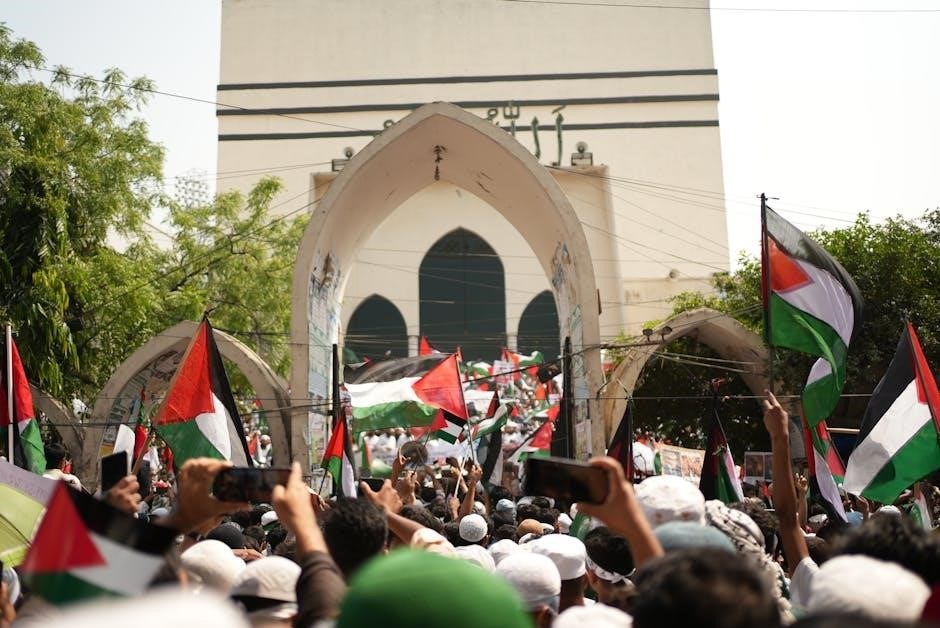
The Six Key Declarations of War
The six key declarations of war include the 1917 Balfour Declaration, 1948 establishment of Israel, 1967 Six-Day War, 1987 First Intifada, 2000 Second Intifada, and 2008-2009 Gaza War.
1917 Balfour Declaration
The 1917 Balfour Declaration was a pivotal moment in the history of Palestine, issued by the British government during World War I. It expressed support for the establishment of a “national home for the Jewish people” in Palestine, then under Ottoman rule. This declaration, contained in a letter from British Foreign Secretary Arthur Balfour to Lord Rothschild, a leader of the British Jewish community, marked the beginning of Zionist claims to Palestine. The declaration ignored the rights of the indigenous Palestinian population, who made up 94% of the land at the time. It sparked widespread opposition from Palestinians, who saw it as a threat to their sovereignty and existence. This event set the stage for a century of conflict, as Palestinians resisted the imposition of a foreign settlers’ movement backed by imperial powers.
1948 Establishment of Israel
The 1948 establishment of Israel marked a turning point in the history of Palestine, leading to the displacement of hundreds of thousands of Palestinians, known as the Nakba or “catastrophe” in Arabic. On May 14, 1948, David Ben-Gurion declared Israel’s independence, triggering the Arab-Israeli War. This event resulted in the expulsion of over 700,000 Palestinians, the destruction of villages, and the erasure of Palestinian identity. The creation of Israel was celebrated by Zionists but devastated the indigenous population, who were denied citizenship and rights. This foundational moment set the stage for ongoing conflict, displacement, and resistance, shaping the modern Palestinian struggle for justice and self-determination.
1967 Six-Day War
The 1967 Six-Day War marked another pivotal moment in the Israeli-Palestinian conflict, as Israel occupied the West Bank, Gaza Strip, Sinai Peninsula, and Golan Heights. This brief but decisive war expanded Israeli territorial control, intensifying Palestinian displacement and resistance. The occupation led to prolonged military rule, settlement expansion, and human rights abuses, deepening the conflict’s complexity. The war also heightened U.S.-Israel alliance and regional tensions, while Palestinians faced growing marginalization. Khalidi’s analysis highlights how the 1967 war entrenched settler colonialism, solidified Israel’s dominance, and reshaped the geopolitical landscape, further entrenching the century-long struggle for Palestinian rights and self-determination.
1987 First Intifada
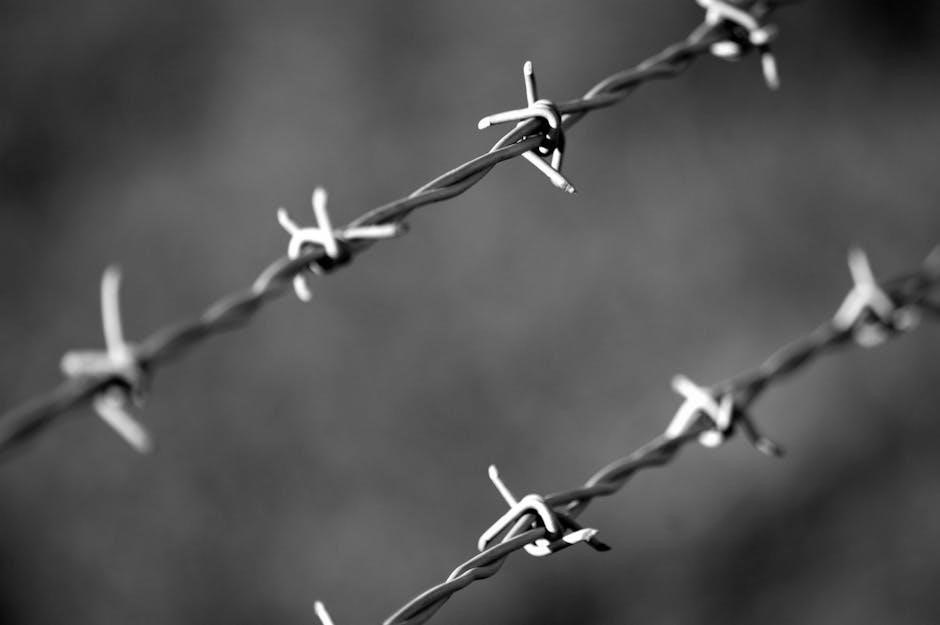
The 1987 First Intifada was a mass Palestinian uprising against Israeli occupation, characterized by widespread protests, strikes, and civil disobedience. It began in Gaza and spread throughout the occupied territories, showcasing Palestinian resilience and unity. The Intifada shifted international attention to the plight of Palestinians, highlighting Israel’s harsh military rule. Khalidi’s account emphasizes grassroots leadership and the emergence of new resistance strategies, such as nonviolent protests and economic boycotts. This period marked a turning point, as Palestinians asserted their right to self-determination, while Israel responded with brutal force, further entrenching the conflict’s complexity and the enduring struggle for Palestinian freedom and justice.
2000 Second Intifada
The 2000 Second Intifada, also known as the Al-Aqsa Intifada, erupted following Ariel Sharon’s provocative visit to the Al-Aqsa Mosque. It marked a violent escalation in the Israeli-Palestinian conflict, with widespread clashes, suicide bombings, and Israeli military crackdowns. Khalidi’s analysis highlights the devastating impact on Palestinian civilians, including heightened Israeli settlement expansion and restrictive movement policies. The Intifada saw the rise of armed factions and the use of heavy weaponry by Israel, leading to significant loss of life and infrastructure destruction. This period deepened the cycle of violence and further complicated prospects for peace, underscoring the entrenched nature of the conflict and its human cost.
2008-2009 Gaza War
The 2008-2009 Gaza War, also known as Operation Cast Lead, was a devastating military offensive launched by Israel in December 2008. The conflict resulted in over 1,400 Palestinian deaths, mostly civilians, and widespread destruction of infrastructure. Khalidi examines how this war exemplified the colonial nature of the conflict, with Israel exerting disproportionate force against a largely defenseless population. The war intensified global condemnation of Israel’s actions and highlighted the humanitarian crisis in Gaza. It also underscored the ongoing imbalance of power and the deepening occupation, further entrenching the cycle of violence and resistance in Palestine.
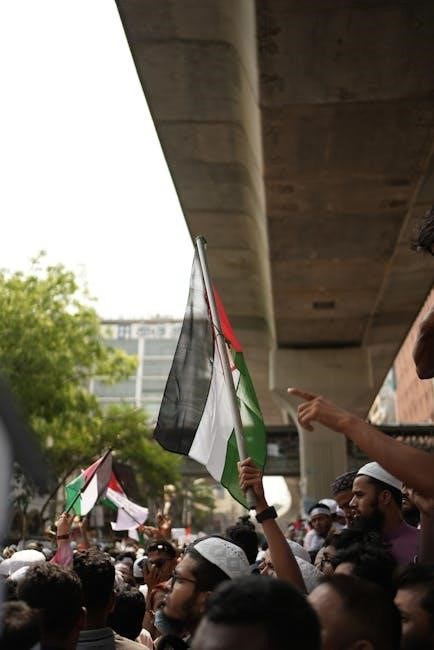
Palestinian Leadership and Diplomacy
Palestinian leaders played a pivotal role in navigating the complex web of diplomacy, advocating for statehood and justice amidst relentless colonial pressures and shifting global alliances.
Role of Key Palestinian Leaders
Rashid Khalidi’s The Hundred Years War on Palestine underscores the critical role of Palestinian leaders in resisting settler colonialism and advocating for national rights. Figures like Yasser Arafat and Mahmoud Abbas emerged as central figures in diplomacy, navigating complex negotiations with Israel and global powers. Khalidi highlights how leaders such as Yusuf Diya al-Khalidi, his ancestor, opposed early Zionist plans, setting a precedent for resistance. These leaders faced immense challenges, balancing internal divisions with external pressures, while striving to maintain Palestinian identity and sovereignty. Their efforts, though often overshadowed by colonial powers, remain vital in the struggle for justice and self-determination.
International Diplomatic Efforts
International diplomatic efforts to resolve the Israeli-Palestinian conflict have been a cornerstone of global engagement, yet their effectiveness remains contentious. The Hundred Years War on Palestine critiques how initiatives like the Oslo Accords and the two-state solution often overlooked Palestinian rights. Rashid Khalidi details how external powers, particularly Britain and the U.S., have historically sided with Israel, undermining Palestinian sovereignty. Despite numerous peace plans, the persistence of settler colonialism and occupation has stifled progress. Khalidi argues that true diplomacy must address the asymmetric power dynamics and recognize Palestine’s right to self-determination, highlighting the need for a more equitable approach to achieve lasting peace.
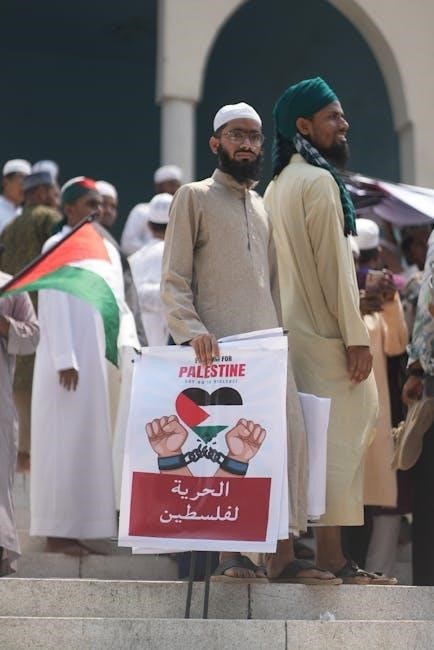
The Human Cost of the Conflict
The conflict has caused immense suffering, with millions displaced, countless lives lost, and generations living under occupation. The refugee crisis and ongoing violence remain central issues.

Displacement and Refugee Crisis
The displacement of Palestinians began with the 1948 Nakba, forcing over 700,000 into exile. Today, millions remain stateless, denied rights in host countries. Khalidi highlights how colonial policies and war have perpetuated this crisis, with refugees trapped in camps for generations. Their plight remains unresolved, a testament to the ongoing human cost of the conflict.
Impact on Civilian Populations
The Hundred Years War on Palestine underscores the devastating impact on civilian populations, marked by widespread displacement, casualties, and psychological trauma. Civilians have endured recurrent military assaults, sieges, and restrictions on basic necessities, exacerbating poverty and despair. The destruction of infrastructure, including hospitals and schools, has severely hindered access to healthcare and education. The ongoing occupation has also inflicted long-term emotional toll, with generations experiencing loss and instability. Khalidi’s account highlights how these injustices have shaped the daily lives of Palestinians, emphasizing their resilience amid relentless adversity and the urgent need for justice and peace.
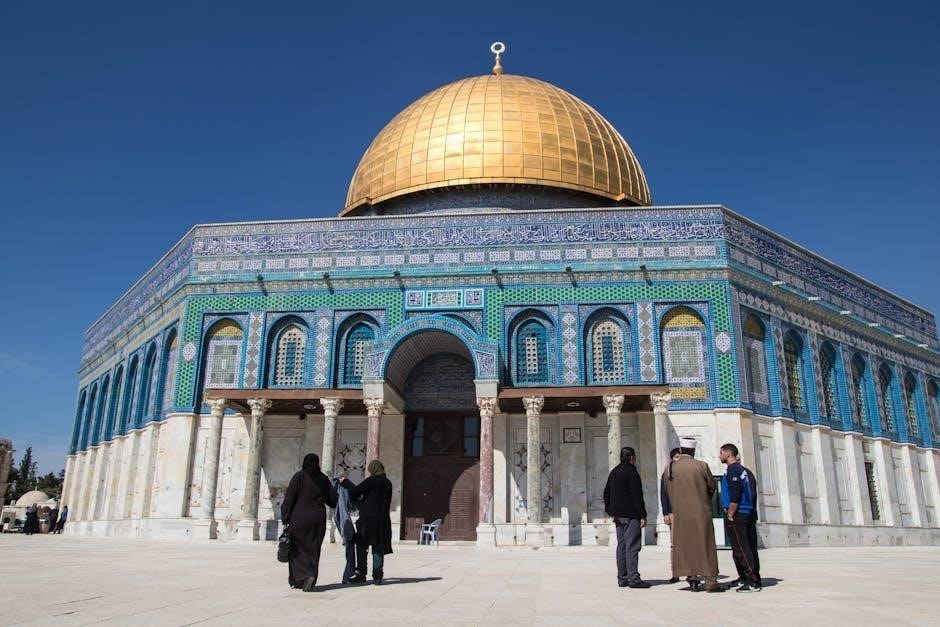
Resistance and Resilience
Palestinians have sustained resistance through grassroots movements, cultural expression, and diplomatic efforts, preserving their identity and rights despite overwhelming odds. Their resilience reflects a steadfast commitment to justice and sovereignty.
Civil Society and Grassroots Movements
Civil society and grassroots movements have played a pivotal role in Palestinian resistance, fostering community resilience and challenging occupation. Organizations, unions, and local initiatives have mobilized to provide essential services, advocate for rights, and sustain cultural identity. These efforts have also amplified international solidarity, bringing global attention to the Palestinian struggle. Through nonviolent resistance, boycotts, and educational campaigns, grassroots movements have become a powerful force against oppression, embodying the spirit of Palestinian resilience and determination to achieve justice and self-determination;
Cultural and Political Resistance
Cultural and political resistance have been integral to Palestine’s struggle, blending art, literature, and activism to challenge oppression. Through poetry, music, and visual arts, Palestinians have preserved their identity and narrated their history. Political resistance has taken many forms, from diplomatic efforts to armed struggle, each reflecting the evolving tactics against colonialism and occupation. These expressions of defiance not only unite communities but also convey the Palestinian story to the world, asserting their right to self-determination and justice in the face of ongoing displacement and marginalization.
The Hundred Years War on Palestine exposes the prolonged dispossession and resistance of Palestinians, highlighting their enduring quest for self-determination and justice amid unrelenting conflict.
Legacy of the Hundred Years War on Palestine
The Hundred Years War on Palestine leaves a profound legacy, revealing the enduring impact of settler colonialism and the unwavering resilience of the Palestinian people. Rashid Khalidi’s work underscores the deep scars of dispossession, displacement, and resistance, shaping the modern Middle East. By examining the role of external powers and internal leadership, the book provides a comprehensive understanding of the conflict’s historical roots and its ongoing implications. The legacy of this war is not just a story of victimhood but a testament to the Palestinian struggle for justice, equality, and the right to narrate their own history.
Future Prospects for Peace and Justice
The path to peace and justice in Palestine requires addressing the historical injustices of settler colonialism and recognizing Palestinian rights to self-determination. Rashid Khalidi’s analysis highlights the need for a paradigm shift, emphasizing equality and mutual recognition. International diplomacy must prioritize Palestinian agency and challenge external powers’ role in perpetuating the conflict. Grassroots movements and civil society play a crucial role in fostering resilience and unity. The future hinges on dismantling colonial structures and fostering a shared vision of coexistence, ensuring that Palestinians and Israelis can live as equals in a land destined for peace and justice.
Related posts:
Grab your free PDF copy of “The Hundred Years’ War on Palestine”! Explore the detailed history and analysis of the conflict. Download now!
Posted in PDF